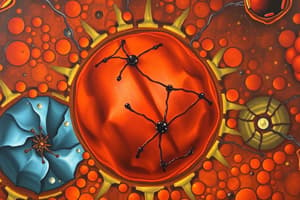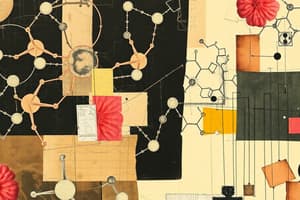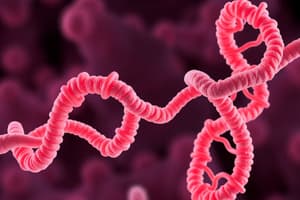Podcast
Questions and Answers
What is the primary energy source used by muscle during physical activity?
What is the primary energy source used by muscle during physical activity?
- Glucose derived from dietary intake
- Glucose exported from blood
- Ketone bodies
- Its own glycogen (correct)
Which of the following correctly describes the composition of glycogen?
Which of the following correctly describes the composition of glycogen?
- A polypeptide of amino acids
- A homopolymer of glucose linked by α-1,4 and α-1,6 bonds (correct)
- A polymer of lipids connected by ester bonds
- A mixture of glucose and fructose
Which substrate is NOT required for the synthesis of glycogen?
Which substrate is NOT required for the synthesis of glycogen?
- UDP-glucose
- AMP (correct)
- Glucose-6-P
- UTP
What is the role of glycogenin in glycogen synthesis?
What is the role of glycogenin in glycogen synthesis?
What enzyme is responsible for cleaving α-1,4 bonds during glycogenolysis?
What enzyme is responsible for cleaving α-1,4 bonds during glycogenolysis?
How does the branching enzyme contribute to glycogen structure?
How does the branching enzyme contribute to glycogen structure?
What is a key characteristic of glucose utilization in the brain?
What is a key characteristic of glucose utilization in the brain?
Which of the following statements about glycogen storage is true?
Which of the following statements about glycogen storage is true?
Which substrates are used in gluconeogenesis?
Which substrates are used in gluconeogenesis?
What is a shared enzyme in both gluconeogenesis and glycolysis?
What is a shared enzyme in both gluconeogenesis and glycolysis?
Which of the following steps in gluconeogenesis is irreversible?
Which of the following steps in gluconeogenesis is irreversible?
What happens to lactate produced by exercising muscle cells in the Cori cycle?
What happens to lactate produced by exercising muscle cells in the Cori cycle?
Which of the following describes the primary issue in glycogen storage disorders (GSDs)?
Which of the following describes the primary issue in glycogen storage disorders (GSDs)?
Which tissue specifically requires glucose and cannot directly utilize fatty acids?
Which tissue specifically requires glucose and cannot directly utilize fatty acids?
What is the effect on the body when glycogen stores are depleted?
What is the effect on the body when glycogen stores are depleted?
Which of the following enzymes is not associated with gluconeogenesis?
Which of the following enzymes is not associated with gluconeogenesis?
What is the primary function of glycogen synthesis?
What is the primary function of glycogen synthesis?
Which hormone is primarily responsible for glycogen synthesis during the fed state?
Which hormone is primarily responsible for glycogen synthesis during the fed state?
In the fasting state, which of the following processes occurs in the liver?
In the fasting state, which of the following processes occurs in the liver?
What role does gluconeogenesis play in the body during fasting?
What role does gluconeogenesis play in the body during fasting?
What is the primary energy source utilized by muscle during fasting?
What is the primary energy source utilized by muscle during fasting?
Which disorder is characterized by glycogen storage abnormalities?
Which disorder is characterized by glycogen storage abnormalities?
During the fed state, which metabolic response occurs in adipose tissue?
During the fed state, which metabolic response occurs in adipose tissue?
What causes the switch in metabolism between fed and fasting states?
What causes the switch in metabolism between fed and fasting states?
What happens to insulin levels during the fasting state?
What happens to insulin levels during the fasting state?
What is the main purpose of the Cori Cycle?
What is the main purpose of the Cori Cycle?
What is the primary direct product of glycogen breakdown?
What is the primary direct product of glycogen breakdown?
Which enzymatic activity is responsible for converting glucose-1-phosphate to glucose-6-phosphate?
Which enzymatic activity is responsible for converting glucose-1-phosphate to glucose-6-phosphate?
How does glucose-6-phosphate regulate glycogen metabolism in the liver?
How does glucose-6-phosphate regulate glycogen metabolism in the liver?
What effect does glucagon have on glycogen metabolism when blood sugar is low?
What effect does glucagon have on glycogen metabolism when blood sugar is low?
Which of the following statements about muscle cells is correct?
Which of the following statements about muscle cells is correct?
Which enzyme is NOT involved in the debranching of glycogen?
Which enzyme is NOT involved in the debranching of glycogen?
During fasting, what happens to glycogen synthesis?
During fasting, what happens to glycogen synthesis?
What is the role of protein phosphatase 1 (PP1) in glycogen metabolism?
What is the role of protein phosphatase 1 (PP1) in glycogen metabolism?
Which of the following is a consequence of AMP accumulation in muscle cells?
Which of the following is a consequence of AMP accumulation in muscle cells?
Cortisol has what type of effect on glycogen metabolism?
Cortisol has what type of effect on glycogen metabolism?
What is the primary role of glycogen in the liver?
What is the primary role of glycogen in the liver?
Which bond types are found in the structure of glycogen?
Which bond types are found in the structure of glycogen?
What initiates the synthesis of glycogen chains?
What initiates the synthesis of glycogen chains?
Which of the following correctly describes the action of the branching enzyme in glycogen synthesis?
Which of the following correctly describes the action of the branching enzyme in glycogen synthesis?
What is the immediate product generated from glycogen during glycogenolysis?
What is the immediate product generated from glycogen during glycogenolysis?
Why does muscle tissue not export glucose to the bloodstream during energy usage?
Why does muscle tissue not export glucose to the bloodstream during energy usage?
Which substrate is necessary for the conversion of glucose to glucose-6-phosphate during glycogenesis?
Which substrate is necessary for the conversion of glucose to glucose-6-phosphate during glycogenesis?
How does glycogen serve as a dynamic resource in the body?
How does glycogen serve as a dynamic resource in the body?
What is one of the main functions of gluconeogenesis in the body?
What is one of the main functions of gluconeogenesis in the body?
Which substrate is primarily utilized in the Cori cycle for producing glucose?
Which substrate is primarily utilized in the Cori cycle for producing glucose?
Which enzyme is specifically involved in the conversion of lactate to pyruvate in the Cori cycle?
Which enzyme is specifically involved in the conversion of lactate to pyruvate in the Cori cycle?
What characterizes glycogen storage diseases (GSD)?
What characterizes glycogen storage diseases (GSD)?
Which of the following enzymes is NOT a shared enzyme between gluconeogenesis and glycolysis?
Which of the following enzymes is NOT a shared enzyme between gluconeogenesis and glycolysis?
What is a consequence of glycogen depletion in the body?
What is a consequence of glycogen depletion in the body?
What metabolic cycle is involved in transporting lactate to the liver for gluconeogenesis?
What metabolic cycle is involved in transporting lactate to the liver for gluconeogenesis?
Which tissues specifically require glucose and cannot use fatty acids directly?
Which tissues specifically require glucose and cannot use fatty acids directly?
Which enzyme is responsible for converting glucose-1-phosphate to glucose-6-phosphate?
Which enzyme is responsible for converting glucose-1-phosphate to glucose-6-phosphate?
How does adrenaline affect glycogen metabolism during exercise?
How does adrenaline affect glycogen metabolism during exercise?
What is the primary allosteric regulator of glycogen phosphorylase in muscle cells during contraction?
What is the primary allosteric regulator of glycogen phosphorylase in muscle cells during contraction?
What role does glucose-6-phosphatase play in glycogen metabolism?
What role does glucose-6-phosphatase play in glycogen metabolism?
Which hormonal regulator decreases glycogen synthesis when blood sugar is low?
Which hormonal regulator decreases glycogen synthesis when blood sugar is low?
During which metabolic state is glycogen synthase primarily activated?
During which metabolic state is glycogen synthase primarily activated?
What effect does AMP have on glycogen metabolism in muscle cells?
What effect does AMP have on glycogen metabolism in muscle cells?
Which of the following correctly describes the function of protein kinase A in glycogen metabolism?
Which of the following correctly describes the function of protein kinase A in glycogen metabolism?
How does insulin affect glycogen metabolism in muscle and liver cells?
How does insulin affect glycogen metabolism in muscle and liver cells?
Which enzyme involved in glycogenolysis is responsible for cleaving the α-(1,6) bond at branch points?
Which enzyme involved in glycogenolysis is responsible for cleaving the α-(1,6) bond at branch points?
What is primarily responsible for the synthesis of glycogen during the fed state?
What is primarily responsible for the synthesis of glycogen during the fed state?
Which process is primarily utilized by the liver during the fasting state to maintain plasma glucose levels?
Which process is primarily utilized by the liver during the fasting state to maintain plasma glucose levels?
What is the primary role of gluconeogenesis during fasting?
What is the primary role of gluconeogenesis during fasting?
Which hormone decreases its levels during the fasting state?
Which hormone decreases its levels during the fasting state?
How does the body respond in terms of muscle metabolism during a fasting state?
How does the body respond in terms of muscle metabolism during a fasting state?
What condition exemplifies a glycogen storage disorder affecting glucose metabolism?
What condition exemplifies a glycogen storage disorder affecting glucose metabolism?
What is the role of adrenaline during the change from the fed to fasting state?
What is the role of adrenaline during the change from the fed to fasting state?
What is a key characteristic of the Cori cycle during fasting?
What is a key characteristic of the Cori cycle during fasting?
In what state would the body primarily be in a catabolic process, utilizing stored nutrients?
In what state would the body primarily be in a catabolic process, utilizing stored nutrients?
Which metabolic pathway is least active during the fed state?
Which metabolic pathway is least active during the fed state?
Flashcards are hidden until you start studying
Study Notes
Carbohydrate Metabolism & Glycogen Synthesis
- Breakdown of glucose in the body is a key metabolic process
- Glucose is stored in a readily mobilizable form – glycogen
- In Liver (~100g) [and muscle (~400g)]
Glycogen Formation and Breakdown
- Glycogenesis is the synthesis of glycogen from glucose
- Occurs in the cytosol
- Requires ATP and uridine triphosphate (UTP)
- Glycogenolysis is the breakdown of glycogen into glucose
- The main direct product of glycogen breakdown is glucose-1-phosphate
- Glucose-6-phosphatase releases free glucose
- This can only occur in the liver
Regulation of Glycogen Metabolism
- Allosteric regulation:
- In the liver Glucose-6-P allosterically
- activates Glycogen Synthase
- inhibits Glycogen Phosphorylase
- Ca2+ and AMP activate Glycogen Phosphorylase in muscle
- In the liver Glucose-6-P allosterically
- Hormonal Regulation:
- Insulin
- Secreted from the pancreas when blood sugar is high
- Activates PP1, which activates glucagon synthase and inactivates phosphorylase
- Promotes glycogen synthesis (storage)
- Glucagon
- Secreted from the pancreas when blood sugar is low
- Activates protein kinase A (PKA)
- Inactivates PP-1, which inactivates glycogen synthase and activates phosphorylase
- Promotes glycogen breakdown and glucose release
- Adrenaline
- Released from the adrenal glands during exercise
- Activates protein kinase A (PKA)
- Inactivates PP1
- Promotes glycogen breakdown and glucose release
- Insulin
Gluconeogenesis
- Gluconeogenesis is the synthesis of glucose from non-carbohydrate sources
- This occurs when glycogen stores are depleted
- Shared enzymes with glycolysis
- Irreversible steps of glycolysis require different enzymes in gluconeogenesis
Substrates for Gluconeogenesis
- Lactate
- Released into blood by exercising muscle
- The Cori Cycle converts lactate back into glucose
- Glycerol
- From triglyceride breakdown in adipose tissue
- Amino acids
- From protein breakdown in tissues
The Cori Cycle
- Metabolic pathway named after its discoverers, Carl and Gerty Cori
- Lactate produced by muscle cells during metabolism is converted into glucose
- Occurs in the Liver
- Liver exports glucose into the bloodstream, where it can be taken up by muscle
Glycogen Storage Disorders
- Group of inherited metabolic disorders caused by a deficiency of enzymes required for glycogen synthesis or breakdown in muscle or liver
- Results in chronic hypoglycaemia
- also enlarged liver, muscle fatigue, cramps
- 12 types of GSD (I-XII)
- Varying severity depending on the particular enzyme affected and its tissue distribution
Post-absorption Processing of Carbohydrates
- Glycogen synthesis and metabolism: Glucose is stored as glycogen in the liver and muscle. Glycogen synthesis occurs primarily in the fed state, when glucose levels are high. Glycogen breakdown (glycogenolysis) occurs during fasting or exercise, when glucose levels are low.
- Hormonal regulation: Insulin promotes glycogen synthesis, while glucagon and adrenaline promote glycogen breakdown.
- Cori Cycle: The Cori Cycle is a metabolic pathway where lactate produced by muscle cells during exercise is transported to the liver and converted back into glucose. This glucose can then be used by muscle cells for energy.
- Gluconeogenesis: Gluconeogenesis is the process of synthesizing glucose from non-carbohydrate sources (lactate, glycerol, amino acids). This occurs when glycogen stores are depleted. Gluconeogenesis is essential for maintaining blood glucose levels during fasting or prolonged exercise.
- Glycogen Storage Disorders: These are genetic disorders that affect glycogen metabolism, leading to an inability to properly store or break down glycogen.
Glycogen Metabolism
- Structure of glycogen: Glycogen is a branched polymer of glucose, with α-1,4 and α-1,6 glycosidic bonds.
- Glycogen synthesis (glycogenesis):
- Occurs in the cytosol.
- Requires ATP and UTP.
- Glucose is converted to glucose-6-phosphate, which is then converted to glucose-1-phosphate.
- UDP-glucose is synthesized and used as a substrate for glycogen synthase, which catalyzes the formation of α-1,4 linkages between glucose molecules.
- Branching enzyme creates α-1,6 linkages, increasing the number of non-reducing ends and allowing for more rapid glycogen synthesis.
- Glycogen degradation (glycogenolysis):
- Glycogen phosphorylase breaks down glycogen by cleaving α-1,4 bonds, producing glucose-1-phosphate.
- Debranching enzyme removes the remaining glucose residues from branch points.
- Muscle cells do not have glucose-6-phosphatase and cannot directly release glucose into the bloodstream.
- Liver cells have glucose-6-phosphatase, allowing for the release of free glucose into the bloodstream.
Regulation of Glycogen Metabolism
- Allosteric regulation: Glucose-6-phosphate activates glycogen synthase in the liver but inhibits glycogen phosphorylase. Muscle contraction (increased Ca2+ and AMP) activates glycogen phosphorylase.
- Hormonal regulation:
- Insulin: Activates protein phosphatase 1 (PP1), which activates glycogen synthase (promoting glycogen synthesis).
- Glucagon and adrenaline: Activate protein kinase A, which inactivates PP1 and activates glycogen phosphorylase (promoting glycogen breakdown).
Gluconeogenesis
- Importance: Gluconeogenesis is crucial for maintaining blood glucose levels during fasting or prolonged exercise, as it provides glucose for tissues like the brain and red blood cells.
- Substrates: Lactate from muscle, glycerol from fat, and amino acids from protein breakdown can be used as substrates for gluconeogenesis.
- Irreversible steps: Gluconeogenesis bypasses three irreversible steps in glycolysis:
- Pyruvate kinase is bypassed by pyruvate carboxylase and PEP-carboxykinase.
- Phosphofructokinase is bypassed by fructose-1,6-bisphosphatase.
- Hexokinase/glucokinase is bypassed by glucose-6-phosphatase
Glycogen Storage Disorders (GSDs)
- Cause: A deficiency of enzymes involved in glycogen synthesis or breakdown.
- Consequences: Can lead to chronic hypoglycemia, enlarged liver, muscle fatigue, and cramps.
- Types: There are 12 known types of GSDs, classified by the specific enzyme affected and its tissue distribution.
Studying That Suits You
Use AI to generate personalized quizzes and flashcards to suit your learning preferences.




